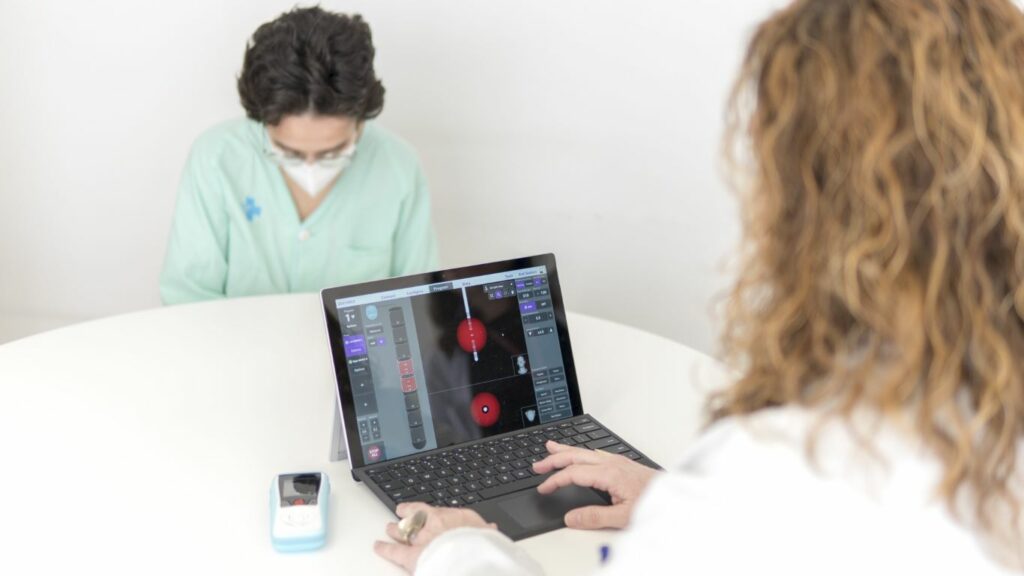The IDIBELL and Bellvitge University Hospital Psychiatry and Mental Health research group has published an article that indicates that men have a better long-term prognosis in treatment with deep brain stimulation (DBS) for Obsessive Compulsive Disorder (OCD). During the last fifteen years, this group has been using the neuromodulation technique in patients with severe and resistant forms of OCD, so the study is part of the analysis of the response to this intervention.
The state-wide scientific breakthrough has been published in the Spanish Journal of Psychiatry and Mental Health (SEPSM) and shows that 76.9% of men responded well to deep brain stimulation, while only 33.3% of the women had a satisfactory outcome. It is the first work that analyzes the gender difference in this procedure, so the specialists urge to confirm the finding with more research and emphasize the need to know the factors involved in the effectiveness of the technique, which is not without risk and which entails a high cost of human and financial resources.
It is estimated that around 5-10% of OCD patients are refractory to available pharmacological treatments and develop extremely severe and disabling forms of the disease, which is accompanied by great suffering for both patients and their families. Over the past two decades, new therapeutic options have been proposed for these patients, including deep brain stimulation. In addition, there are recent studies that confirm that the improvement achieved in the first years of deep brain stimulation is maintained over time.
The limited number of OCD patients undergoing this procedure to date means that sex differences in the pattern of response to neurostimulation have not been explored, nor whether these differences might modulate the incidence of other variables. Although the results obtained must be considered preliminary, given the small number of patients included in the study, they do point to a possible influence of sex on the long-term response to DBS.
Gender does not appear to significantly affect the overall response to pharmacological or cognitive-behavioral treatments in OCD, unlike other factors such as age, family history of OCD, initial severity, or age of onset. However, the subgroup of patients with particularly severe forms of OCD, refractory to all other types of treatment and receiving deep brain stimulation, could have different characteristics at the brain level that would explain an influence of sex on the long-term response to the neurostimulation
OCD, the “disease of doubt”:
People suffering from Obsessive Compulsive Disorder have unwanted thoughts, images or impulses (obsessions) that cause repetitive mental behaviors or actions (compulsions), aimed at reducing the discomfort that the obsessions cause. These obsessions and compulsions, as well as the avoidant behaviors that often accompany them, impact the activities of daily life, causing them great emotional suffering.
Approximately 2-3% of the general population develops OCD, and no specific cause is known, although genetic and environmental factors are involved. The OCD Unit of the HUB Psychiatry Service is a benchmark in research on this disorder at the national and international level and continues to conduct research to improve the quality of life of people who suffer from it.
Adapted from bellvitgehospital.cat
The Bellvitge Biomedical Research Institute (IDIBELL) is a biomedical research center created in 2004. It is participated by the Bellvitge University Hospital and the Viladecans Hospital of the Catalan Institute of Health, the Catalan Institute of Oncology, the University of Barcelona and the City Council of L’Hospitalet de Llobregat.
IDIBELL is a member of the Campus of International Excellence of the University of Barcelona HUBc and is part of the CERCA institution of the Generalitat de Catalunya. In 2009 it became one of the first five Spanish research centers accredited as a health research institute by the Carlos III Health Institute. In addition, it is part of the “HR Excellence in Research” program of the European Union and is a member of EATRIS and REGIC. Since 2018, IDIBELL has been an Accredited Center of the AECC Scientific Foundation (FCAECC).

